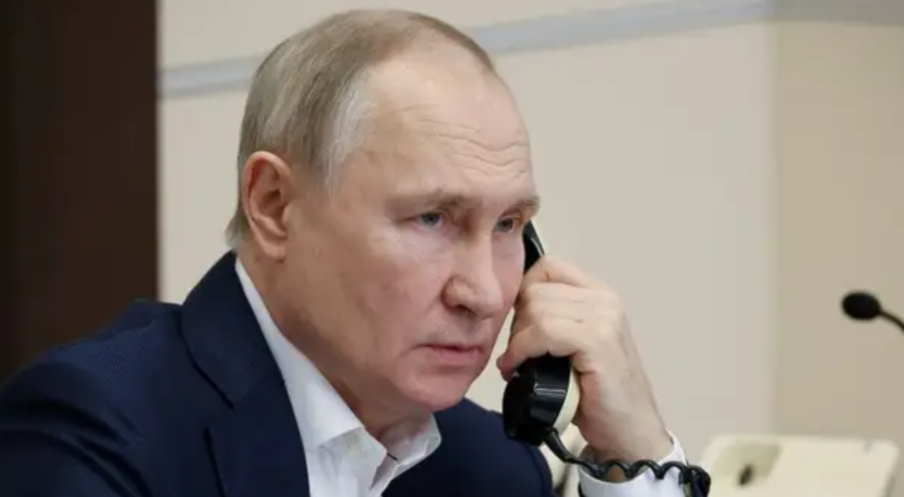Putin, Iran's Mokhber discuss cooperation and joint projects
The two leaders addressed international cooperation, particularly Russia's presidency of BRICS, the Kremlin reported.
-

Russian President Vladimir Putin talks on the phone in Moscow on January 3, 2023. (AFP)
The Kremlin has reported that Russian President Vladimir Putin spoke by phone with acting Iranian President Mohammad Mokhber Thursday to discuss bilateral cooperation and the realization of cooperative projects.
Iran initiated the phone call, in which both parties indicated their willingness to expand Russian-Iranian cooperation, including the completion of prospective cooperative projects in energy and transportation, according to a Kremlin statement.
"The full implementation of all concluded agreements, including in the fields of trade, transit and energy, forms the main agenda of bilateral relations, and the Islamic Republic of Iran is determined to implement them," Mokhber said, as quoted by the Iranian presidency.
Mokhber stated that bilateral relations between Iran and Russia are of a strategic nature and are based on unchanging principles.
The Kremlin in a statement detailed, "On the initiative of the Iranian side, Vladimir Putin held a phone conversation with … Mokhber. Both sides expressed interest in further development of Russian-Iranian cooperation, including the implementation of promising joint projects in the fields of energy and transportation."
The two sides also addressed international cooperation, particularly Russia's presidency of BRICS, the Kremlin added.
The Iranian President congratulated Putin on a Russian holiday celebrated on June 12, the Kremlin detailed.
He thanked them for their support in the current difficult period for the Islamic Republic of Iran after the tragic death of President Ebrahim Raisi.
Vladimir Putin, on his part, congratulated all Muslims in Iran on the upcoming Eid al-Adha holiday and wished [Mokhber] success in the ongoing election campaign, the Kremlin added, citing that Putin also extended his best wishes to the Iranian leader Sayyed Ali Khamenei.
On Wednesday, Putin approved a law ratifying the free trade agreement between the Eurasian Economic Union (EAEU) and Iran. The document, published on the official website is aimed at reducing or eliminating tariff and non-tariff barriers in trade and fostering economic cooperation between the EAEU and Iran, was signed during a meeting of the Supreme Eurasian Economic Council in St. Petersburg, Russia, on December 25, 2023.
Iran, Russia advance comprehensive treaty talks
Russian Foreign Minister Sergey Lavrov and acting Iranian Foreign Minister Ali Bagheri convened on Monday during the sidelines of the BRICS foreign ministers meeting in Nizhny Novgorod, Russia, to discuss the finalization of a new comprehensive bilateral treaty, the Russian Foreign Ministry said in a statement.
The ministry disclosed that significant progress had been made, with both parties concurring on the treaty's principal aspects.
"Special attention was paid to finalizing work on the text of a new comprehensive inter-State treaty, the main aspects of which have been agreed upon by both parties," affirmed the ministry in a statement.
Iran's acting Foreign Minister Ali Bagheri Kani met with his Russian counterpart Sergey Lavrov on the sidelines of the BRICS Ministerial Council meeting in Nizhny Novgorod. pic.twitter.com/WKPpj6CBp3
— Press TV 🔻 (@PressTV) June 10, 2024
The meeting focused on measures aimed at fostering a strategic partnership between Russia and Iran, aligning with the political directives outlined by the leaders of both nations.
Lavrov and Bagheri engaged in extensive discussions concerning major international and regional matters of mutual interest, including collaboration within the frameworks of BRICS and the Shanghai Cooperation Organization (SCO).
During the discussions, the Iranian diplomat expressed Tehran's heightened enthusiasm for broadening and reinforcing collaboration with Russia.
He also thanked the Russian side for their condolences following the tragic helicopter crash in May, which claimed the lives of Iranian President Ebrahim Raisi, Foreign Minister Hossein Amir-Abdollahian, and other officials.

 4 Min Read
4 Min Read








